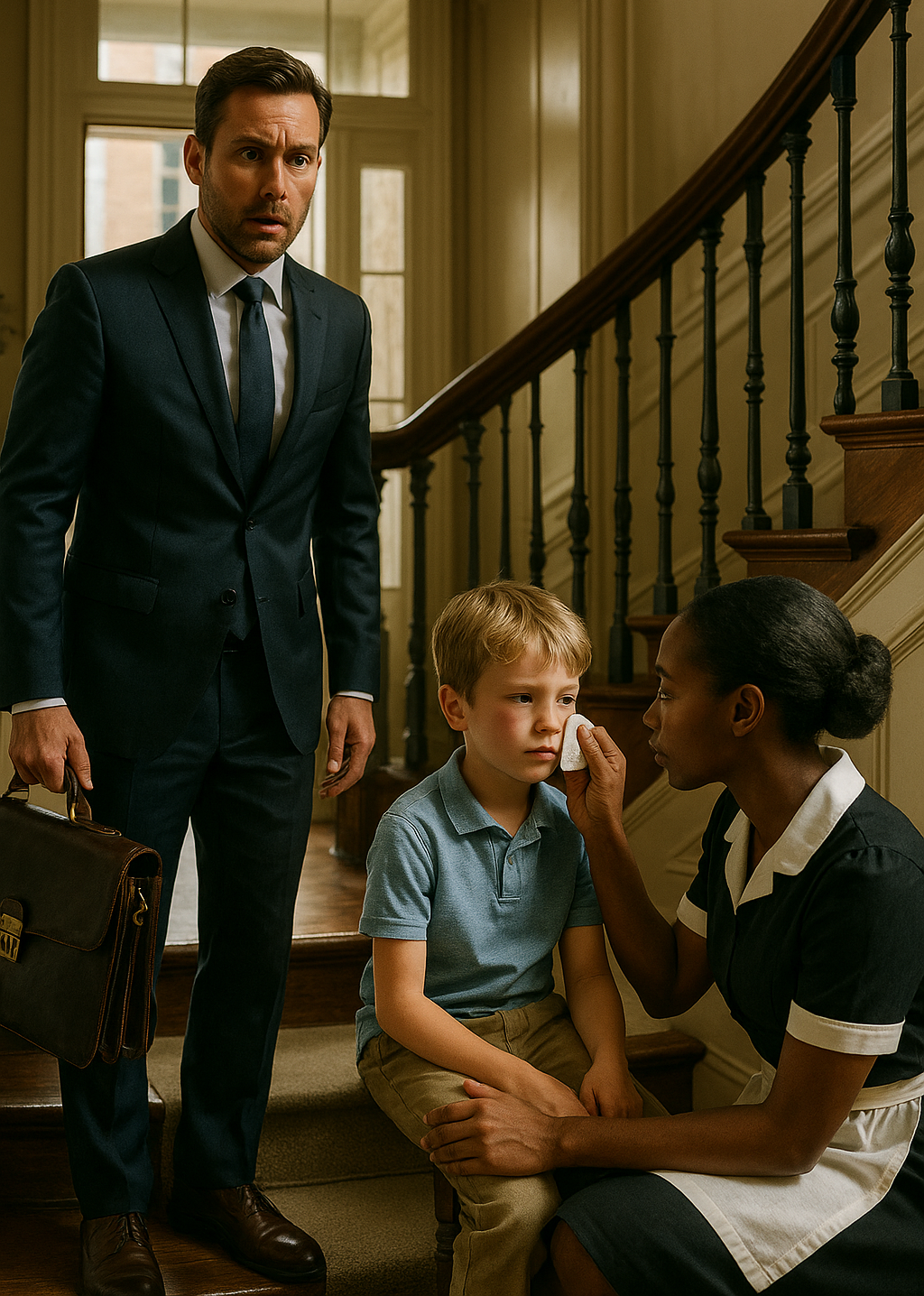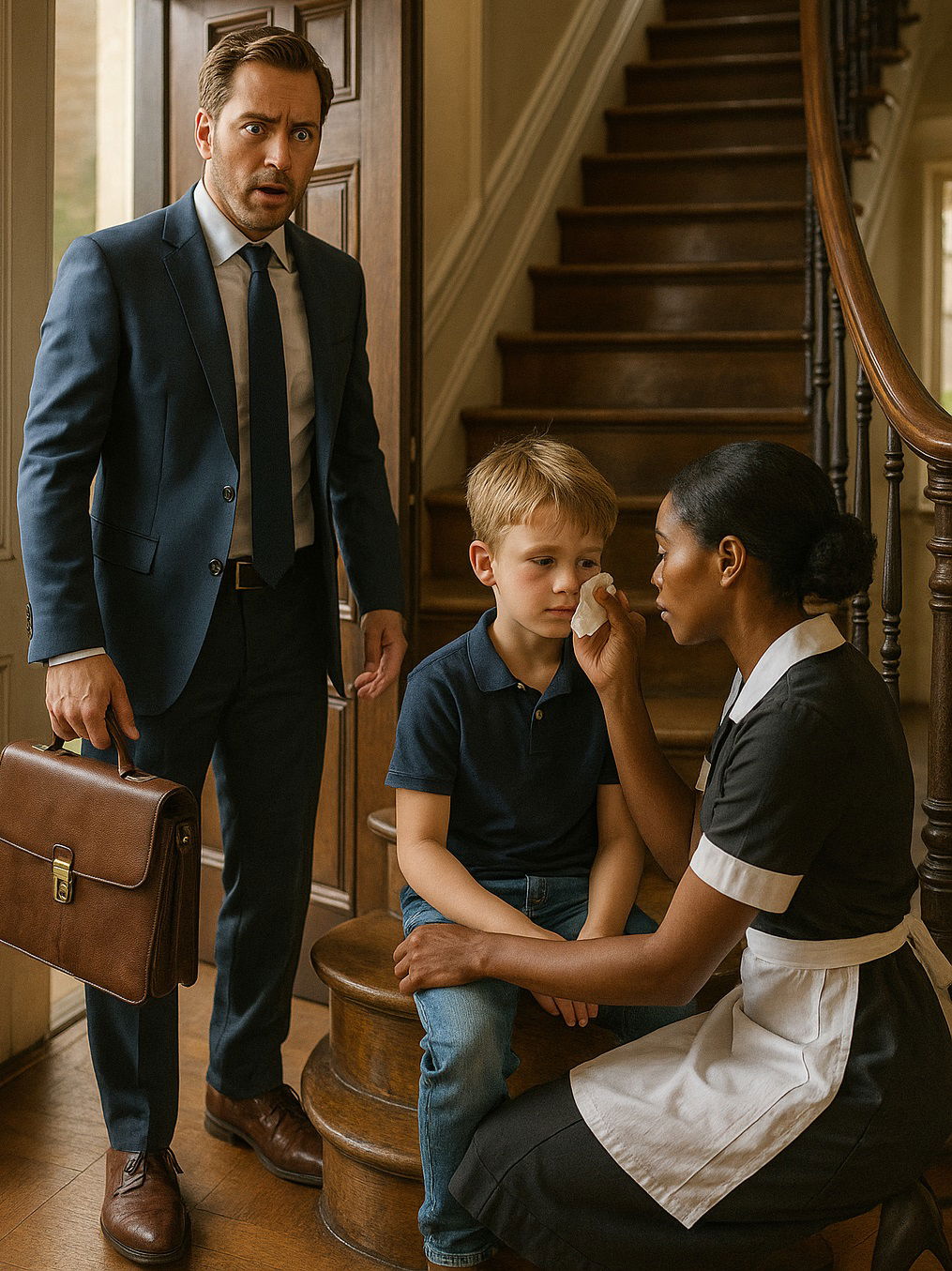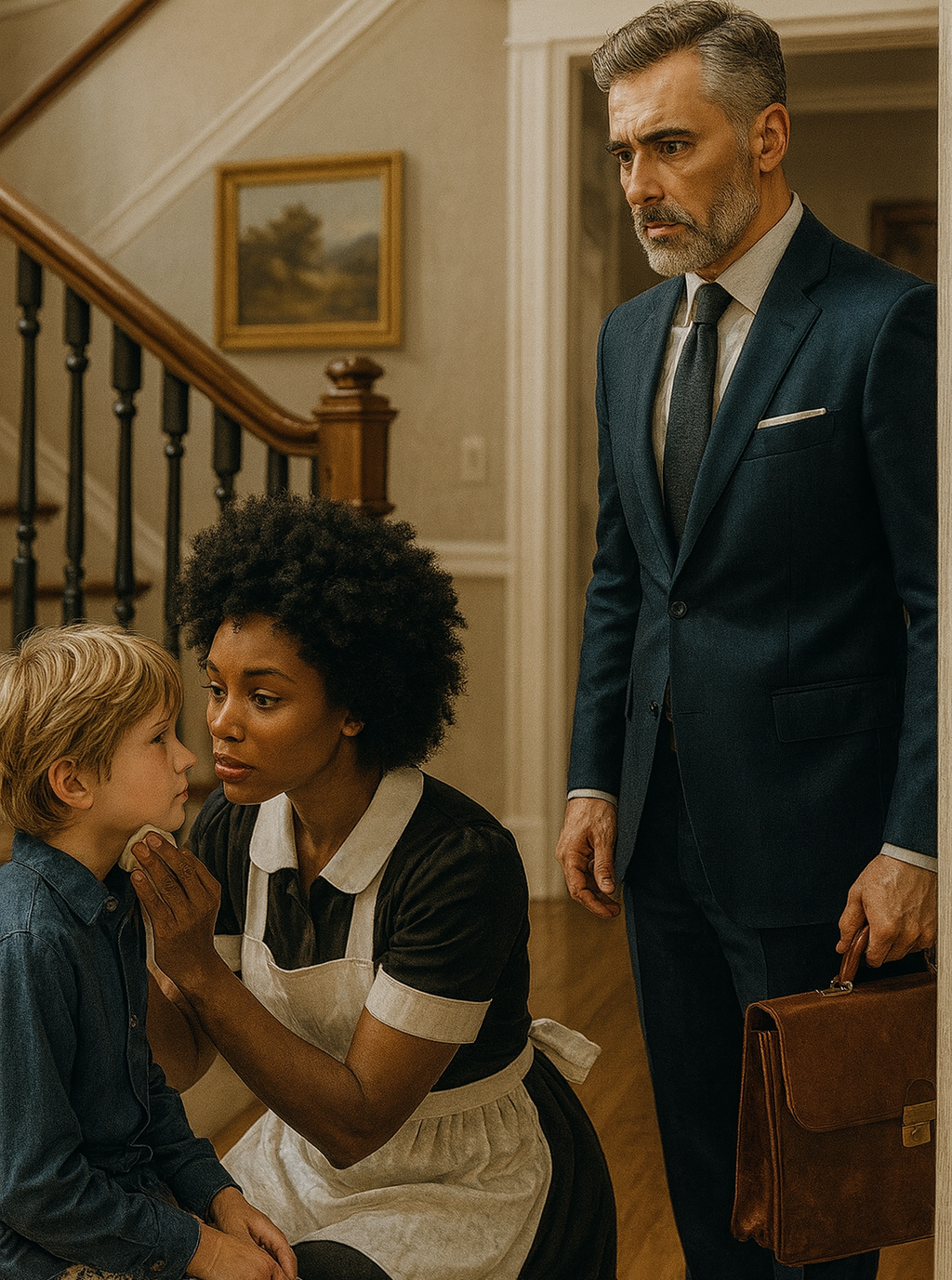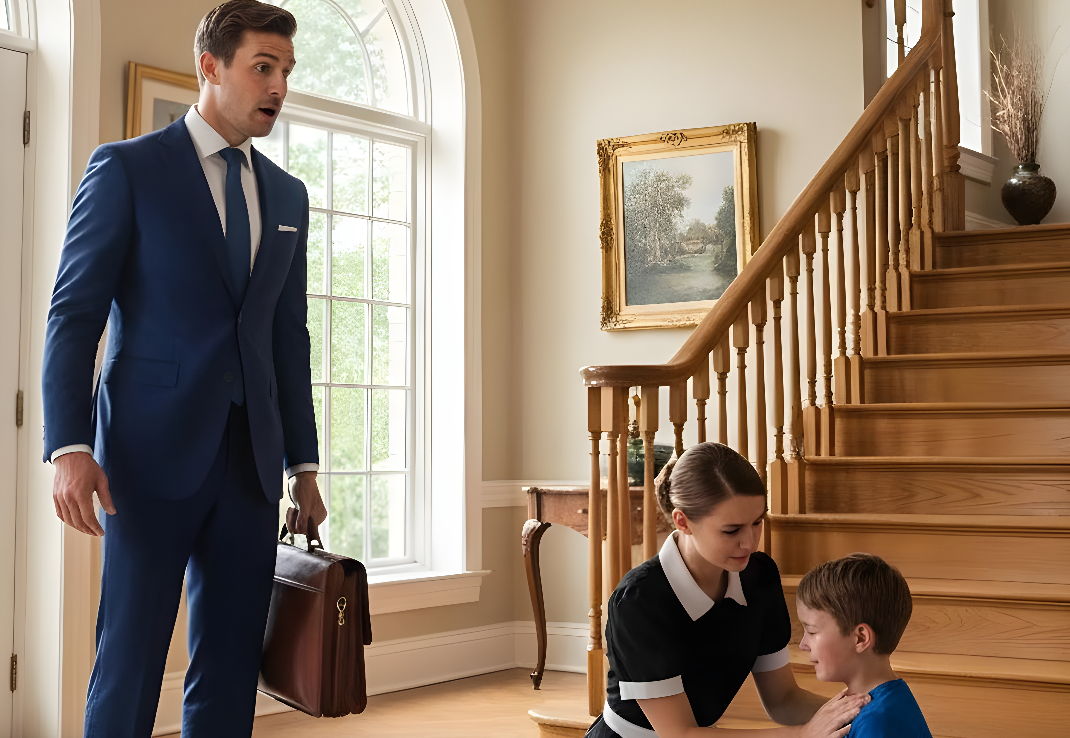Richard Lawson was not supposed to arrive home before dusk. His schedule was packed with a dinner meeting with investors, his assistant had the car ready downstairs, and the usual evening briefing awaited him faithfully on his desk. Yet, when the elevator doors opened to the serenity of his residence, the bustling world outside fell silent. Instead, a faint, controlled sobbing and a gentle whisper saying, “It’s okay. Look at me. Breathe” met his ears.
He entered through the front door, briefcase in hand. On the stairs, his eight-year-old son Oliver sat motionless, his bright blue eyes shimmering with unshed tears. A slight bruise marked his cheek. Kneeling before him, Grace, the family’s caretaker, tenderly wiped his face with a cool cloth, turning the entire entryway into a sanctuary of compassion.
A lump formed in Richard’s throat. “Oliver?”

Grace met his gaze. Her hands didn’t shake; they remained steady, like a heartbeat. “Mr. Lawson. You got home early.”
Oliver’s gaze dropped to his socks. “Hi, Dad.”
“What happened?” Richard asked, his voice sharper than intended, anxiety tightening his chest.
Clearing her throat, Grace replied softly, “A minor accident.”
“A minor accident,” Richard repeated, noticing the bruises.
Oliver shivered as if those words were a blow. Grace placed her hand gently on the boy’s shoulder. “May I finish? I’ll explain everything after.”
Richard nodded, setting down his briefcase. The faint scent of lemon oil and lavender soap, which Grace used to clean the bannisters, filled the house. Everything looked set for a normal evening, yet nothing felt ordinary.
After applying the compress, Grace carefully folded the cloth as if closing a cherished book. “Oliver, do you want to explain to your dad or should I?”
Oliver pressed his lips tightly together. Grace glanced at Richard. “We had a meeting at school.”
“At school?” Richard frowned. “I didn’t receive any notification.”
“It wasn’t planned.” Grace’s steady gaze was calm, neither evasive nor defensive. “I’ll tell you everything. But maybe we should sit down first?”
The Story Unfolds
They moved to the living room where the angled sunlight reflected off polished wood, gilding picture frames: Oliver on the beach with his mother, at a piano recital, a baby Oliver resting on Richard’s chest. Those Saturdays came to mind—silent teleconferences warmed by a small heartbeat against his shirt.
Richard seated himself facing his son and forced his tone to be gentle. “I’m listening.”
“It happened during reading circle,” Grace explained. “Two boys teased Ollie for reading slowly. He stood up for himself but also taunted another boy. A fight broke out, and Oliver ended up with the bruise. The teacher separated them.”
Richard clenched his jaw. “Bullying,” he muttered, the word striking heavily. “Why wasn’t I called?”

Oliver’s shoulders lifted toward his ears. Grace lowered her voice. “The school contacted Mrs. Lawson. Since you were in a presentation, she asked me to come instead. They didn’t want to alarm you.”
A familiar irritation surfaced: Amelia making decisions, smoothing out the creases in his life so he could keep going. Efficient. Frustrating. Protective. He exhaled slowly. “Where is she?”
“Stuck in traffic,” Grace hesitated. “She’ll be home soon.”
“What exactly did the school say?” Richard pressed. “Is Oliver in trouble?”
“There’s no trouble,” Grace replied. “They suggested a review and also recommended an evaluation for dyslexia. Which—I said with a faint, apologetic smile—I think would help.”
Richard blinked. “Dyslexia?”
“Sometimes words look like puzzle pieces to Oliver,” he murmured so quietly Richard nearly missed it. “Grace helps me.”
Richard stared at his son, picturing him as a baby again, curls wet and clinging to his forehead after the bath. A child building block cities with the precision of a little architect. He had noticed some hesitation during homework, the restlessness. He had chalked it up to childhood unease, to being eight. Was he… inattentive? Or simply unaware?
Grace pulled a worn notebook from her apron pocket and slid it onto the coffee table. “We’ve been practicing rhythm,” she explained. “Clapping out syllables, reading to a beat. Music helps.” Inside, Richard found neat columns: dates, scribbled stars, small milestones such as reading three pages independently, asking for the next chapter, speaking up in class. At the top, in Oliver’s uneven handwriting, “Courage Points” was written.

A part of Richard relaxed. “You’ve been doing all this?” he asked.
“We have,” Grace nodded toward Oliver.
“The school thought I shouldn’t have fought back,” Oliver said, as if confessing a secret that burned. “But Ben was crying. They made him read aloud, and he kept mixing up the ‘b’ and the ‘d’. I know how that feels.”
Richard swallowed hard. The bruise was insignificant compared to the courage his son displayed. “I’m proud you stood up for him,” he said softly. “And I’m sorry I wasn’t there.”
Grace exhaled, the relief softening her posture. “Thank you.”
The door rattled as Amelia burst in, her fragrance a whisper of gardenias. She froze on seeing them, guilt etched across her face. “Richard… I…”
“Save it,” he said too quickly. Amelia shuddered and forced herself to breathe. “No. Don’t save it. Tell me why I had to find out by chance.”
She carefully set her bag down. “Because the last time I brought you something for school on a presentation day, you didn’t speak to me for an hour. You said I had distracted you. I thought… I thought I was protecting you from yourself.”
The words struck with sharp accuracy. He recalled that day—the hurried tie, the halting sentence he wished he could take back. He looked at Oliver, whose thumb traced the edge of the Courage Points notebook like a shoreline.
“I was wrong,” Amelia admitted. “Grace has been wonderful, but you’re Oliver’s father. You should have been the first choice.”
Grace stood. “I’ll give you some time.”
“No,” Richard said quickly, turning to Amelia. “Don’t leave. You’ve been filling the gaps I left. It’s not something you should do alone.”
Silence enveloped the room. After a deep breath, Richard faced Oliver. “When I was your age,” he began, “I used to hide a paperback under the table. I wanted to be the first to finish it. But the lines jumped. The letters looked like bugs under a jar. I never told anyone.”
Oliver looked up sharply. “You?”
“I never named it,” Richard said. “I just worked harder and became great at pretending. It made me efficient.” He chuckled softly. “And I got impatient with anything that slowed down the machine.”
Grace’s gaze softened. “It can work differently, you know?”
He looked at her. Then at his son. Then at his wife. “It has to.”

A New Rhythm
That evening, they gathered around the kitchen island with calendars spread out like treasure maps. Richard blocked out Wednesdays at six o’clock—the Dad and Ollie Club—marked with permanent ink. “No meetings,” he told his absent assistant, half to the part of himself that always squeezed in one last call. “Non-negotiable.”
- Committed weekly time together
- Building stronger family bonds
- Supporting Oliver’s progress collaboratively
Amelia passed him her phone. “I’ve scheduled the evaluation for next week,” she said. “We’ll all go.”
“We’ll all go,” Grace added shyly. “If that’s okay. Oliver asked me to come.”
“More than okay,” Richard assured her. “Grace, you’re not just our caretaker. You’re Oliver’s coach. And apparently, ours too.”
Her smile wavered. “Thank you.”
The school conference arrived three days later. Sitting in tiny chairs that made Richard’s knees feel comically large, he heard the teacher describe Oliver’s kindness, sharp mind, and frustration when words felt like unbreakable nets. Grace discussed rhythm and courage points. Amelia, calm and precise, inquired about accommodations: audiobooks, extra time, and choices about when to read aloud.
Oliver cleared his throat. From a wrinkled note in his pocket, he looked at his father. “May I?”
Richard nodded.
He unfolded the paper and read slowly, tapping his knee to a rhythm only he perceived: “I don’t want to fight. I want to read like building Lego. If the letters stayed still, I could do anything.”
A wave of unspoken emotions—apologies, promises, a childhood learned to be conquered—rose in Richard’s chest. Leaning forward, he told the teacher, counselor, and his son: “We will make sure the letters stay still.”
The counselor smiled warmly. “That’s why we are here.”
Walking home, Oliver kicked a stone along the sidewalk, each tap a percussion in the calm afternoon. “Dad?”
“Yes?”
“Do adults get courage points?”
Richard paused thoughtfully. His former self might have joked about extra credits. The new answer came like fresh air. “They do. But they have to earn them just like kids.”
Oliver grinned. “How many do you have?”
“Today?” Richard glanced at Amelia and Grace a few steps ahead, heads together in a relaxed camaraderie shaped by shared care. “I think I earned one for listening and maybe two for admitting I was wrong.”
Oliver looked up at the sky. “You can get another if you come to the park and push me on the swings.”
“Deal,” Richard said earnestly.
Gradual but Meaningful Change
The transformation wasn’t instantaneous. Genuine change seldom is. But Wednesdays turned into a ritual: pizza laden with basil, chapter books read in rhythm on the kitchen counter, Lego bridges stubbornly refusing to collapse. Richard found himself leaving the office early without excuses. He learned leadership wasn’t about always being the first to know but about being the first to stay, present for the moments that really mattered.
One night, after Oliver fell asleep, Richard found Grace in the hallway folding laundry. “I don’t think I ever asked,” he said, “how did you know so much about this? The strategies, the patience?”
Her hands stilled. “My little brother,” she whispered. “We didn’t name it either — just shame and frustration. The librarian taught me the rhythm trick. It changed everything for him.”
Richard nodded. “You’ve changed everything for us.”
Her eyes glistened. “He changed everything for me first.”

Richard lingered by Oliver’s door after Grace left, watching his son breathe softly. On the bedside table lay the Courage Points notebook. On the final page, a new line had been carefully penned in Oliver’s handwriting:
Dad: 5 points. Kept his promise. The letters started staying still.
He smiled. In the quiet house—his home, their home—he finally realized the hidden truth from that first startling moment on the stairs: power wasn’t about controlling every outcome. It was the courage to be present through the disorganized rhythms of a familiar song. It meant learning new beats and choosing, again and again, to stay in time.
He turned off the lamp, closed the door almost fully, and let the darkness settle. Lavender still scented the bannister in the hall. Somewhere downstairs, his briefcase waited patiently, important and untouched. It would be there in the morning.
Tonight, he walked to the kitchen where blank cards and a marker rested beside a bowl of lemons. On one, he wrote “Thank you” and left it on the counter for Grace, adding neat checkboxes alongside “Fundraise” and “Tuition Fund”. Then he made a second card — Dad and Ollie Club Schedule: Build a Bridge That Sings — and taped it to the refrigerator.
The machinery of his life hadn’t broken. It simply learned a better rhythm. And in the early morning hours, between one decision and the next, the moment that once frightened him now felt like the grace that gave a face to bravery: a boy brave enough to speak, a woman firm enough to listen, and a man finally willing to lead where it mattered most—the home.
Note: This story is inspired by real events and individuals but has been fictionalized for creative purposes. Names, characters, and details have been altered to protect privacy and enrich the narrative. Any resemblance to real people or events, living or deceased, is purely coincidental and unintentional.
